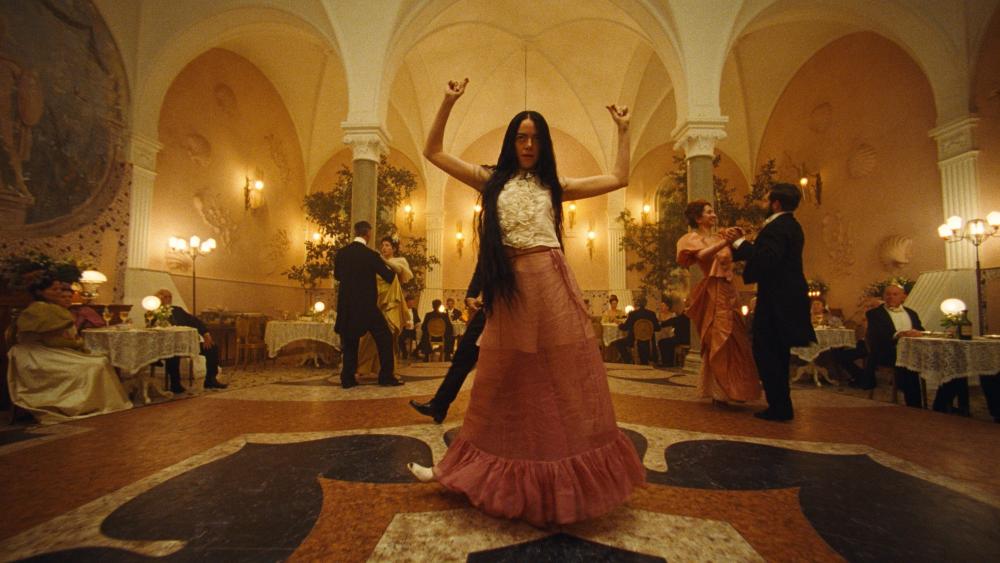What Yorgos Lanthimos' 'Poor Things' has to say about female sexual desire and the commodification of bodies


Postgraduate student Valentina Frassa explores how Yorgos Lanthimos's critically acclaimed film 'Poor Things' provides commentary on pressing socio-economic issues of our time and contributes to ongoing debates around female empowerment and the commodification of women's bodies.
Kinds of Kindness', the new movie by acclaimed Greek director Yorgos Lanthimos, has just had its theatrical release in the UK. In it, he reunites with actress Emma Stone after the dazzling success of their most recent collaboration, 'Poor Things', which garnered 11 Oscar nominations and earned Stone her second win. This new release offers a great opportunity to turn our gaze back to 'Poor Things', a movie that captivated audiences and critics alike and that also serves as a poignant exploration of the socio-economic issues of our time.
An adaptation of Alasdair Gray’s 1992 novel, Poor Things follows the story of Bella Baxter. After taking her own life, she is brought back by unorthodox scientist Godwin ‘God’ Baxter, who substitutes her brain with that of her unborn foetus. This reimagination of Mary Shelley’s Frankenstein serves as a modern-day fable, which follows this woman in a fantastical journey from innocence to mastery of her destiny.
The formulation of a woman as a ‘tabula rasa’, provides Lanthimos with a lens through which to dismantle the paradoxes inherent to patriarchal structures. Bella’s odyssey across the world becomes a journey of self-discovery and sexual liberation, transcending the societal constraints that were once imposed upon her.
Set in a retro-futuristic Victorian London, the film maintains an aura of fantasy, while interacting with a recognisable modernity and evoking categories of time, location, social class and racial identity deeply rooted in history. These mechanisms allow the film to provide sharp commentary on 21st century issues, such as sexual liberation, the sex work industry, and patriarchal power structures. These contributions, as well as ongoing debates within the field, will be explored below.
Women as their own means of production
One of the issues Lanthimos most directly confronts is the concept of women’s sexual liberation. It is Bella’s early sexual awakening that leads her out of the confinement of God’s home and into a grand adventure across the world in the company of Duncan Wedderburn, a wealthy aristocrat. Duncan progressively attempts to control Bella's time and focus, harbouring resentment toward the expansion of her intellectual interests and her sexual autonomy.
In an attempt to escape Duncan and, in desperate need of an income, Bella starts working in a Parisian brothel, where she finds a sense of liberation. It is through sex work that she acquires the resources of time, finances, and energy to participate in socialist gatherings, engage with philosophy, attend medical lectures and strategically plan her path toward freedom. It is at this point that Bella proudly claims that she is her own means of production.
Poor Things revels in this subversive game and invites the spectator to envision female sexuality as if untouched by societal rules, violence and the controlling power of shame.
Poor Things revels in this subversive game and invites the spectator to envision female sexuality as if untouched by societal rules, violence and the controlling power of shame. This is particularly interesting considering the working class has been historically presented as subjected to external forces, and therefore pliable in the hands of a strategic bourgeoisie and an influential state.
The film gracefully portrays Bella as capable of creating her own values and attitudes that align with the demands of life in an industrial society (Thompson, 1981). Although this is an interesting intellectual exercise, it has also faced criticism for falling short in capturing the intricacies of sex work and the commodification of women's bodies. Additionally, the film has been faulted for placing sexual liberation at the forefront of the female struggle for emancipation.
Sexual liberation as emancipation?
It could be argued that Bella’s true awakening and loss of innocence is not sexual. During her travels in a Mediterranean steamship Bella disembarks in Alexandria, where the sight of impoverished Egyptians forces her to confront the inequality that plagues society. The film evidently presents this as a point of inflection on Bella’s development. However, in the final act, the focus abruptly returns to sexual pleasure as a source of emancipation when Bella’s previous husband returns and attempts to perform a clitoridectomy on her.
Here, sex is recentred as an allegory for female self-discovery and emancipation, abandoning Bella’s political awakening and the systemic societal issues witnessed in Alexandria. Nevertheless, Poor Things particularly excels when subverting traditional stereotypes, creating room for a form of escapism at the very least, and the power to envision alternatives when most revolutionary.
In a society where heterosexuality is organised to prioritise men’s pleasure and a double standard operates to legitimise men’s sexual freedom, reclaiming the story through a woman that takes full command over her sexual desires is no doubt a radical stance.
Debates around sex work and media portrayals
Moreover, prostitution was a key social and moral concern in Victorian times. In 1834, women were made financially responsible for illegitimate children in the eyes of the law (Cody, 2000). The contractual nature of sexual relationships often negated female sexual desire, which was reserved for men. Through Bella’s story, the film subverts these ideals but: does this come at a cost?
Portrayals of prostitution in mainstream media both mirror and inform perspectives on the sex work industry, often 'sensationalising, simplifying or exoticising the issue'. Some have accused Poor Things of mobilising sex workers as a plot device, when not actually concerned with them as and of themselves. Instead, they serve as a mechanism to draw attention to the socio-economic position of women more broadly. The intentionally embellished portrayal of sex work brings attention to and disrupts detrimental norms, yet runs the risk of caricaturising and instrumentalising sex workers as tools for every woman’s liberation.
The story adds to the ongoing debate around whether women's engagement in sex work represents an expression of autonomy or if, alternatively, it is another symptom of oppressive patriarchal systems. Many sex work activists reject the stigma associated with prostitution by redefining their roles as participants in the global economy. In an interview conducted in 2018 Monique Prado, a sex work activist from Brazil and member of the ‘puta-feminismo’ movement, reclaimed sex work as ‘a way to problematise the ways in which women’s labour is often unremunerated’.
On the other hand, sex worker and activist Molly Smith conceptualises prostitution as ‘an obvious symptom of capitalism’ arguing that, in a world where needs could be fulfilled through communal efforts and currency held no significance, there would be no incentive to enter the field of sex work.
All in all, this film is indisputably a cinematic feat and a testament to boundless creativity. This has served to spark a timely debate amongst audiences, contributing interesting insights to the discussion around female sexual empowerment. Poor Things is revolutionary in its fearless portrayal of unapologetic feminine sexual desire. However, it falls short in advocating for societal transformation beyond the individual rejection of these norms. In spite of this and, in the face of a stark reality, spending time within the confines of this beautifully crafted utopia can prove personally and intellectually liberating.
The blog is original work for the Feminist Political Economy and Global Development course.
Header Image Credit: ©Disney via press.disney.co.uk
About the author
Valentina Frassa Bolognese is a Psychology and Education graduate currently pursuing an MSc in Development Studies with a focus on Gender. She is actively engaged in the charity sector, specialising in migration issues.





